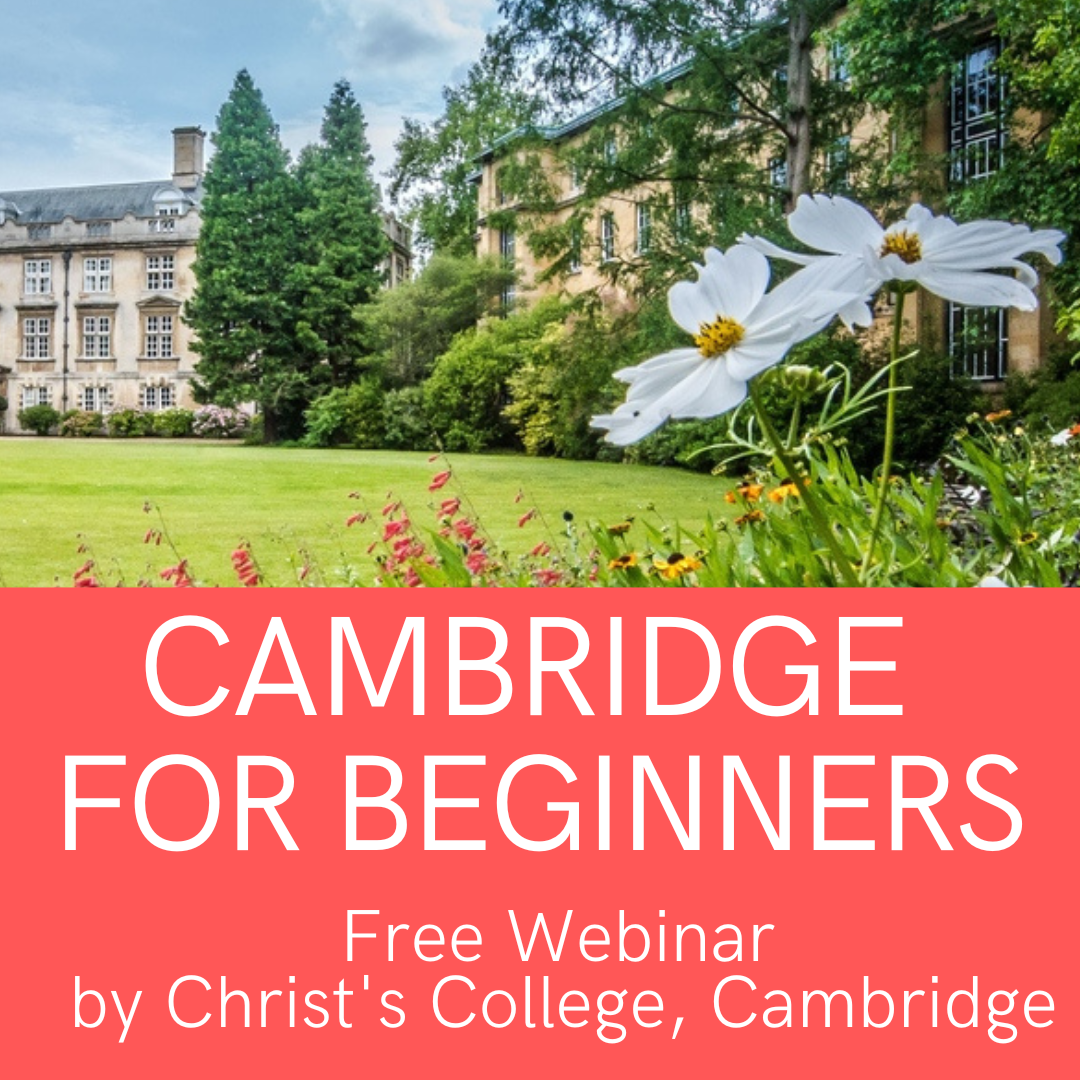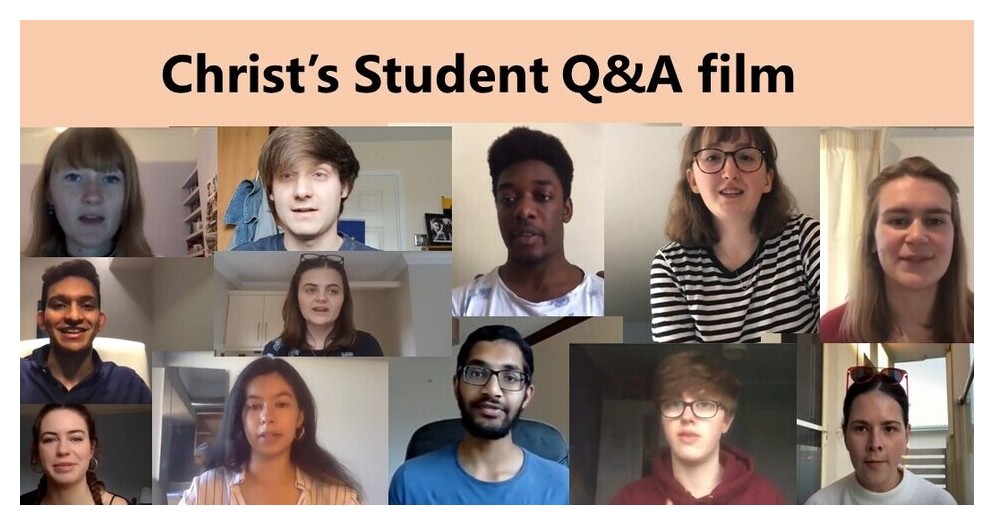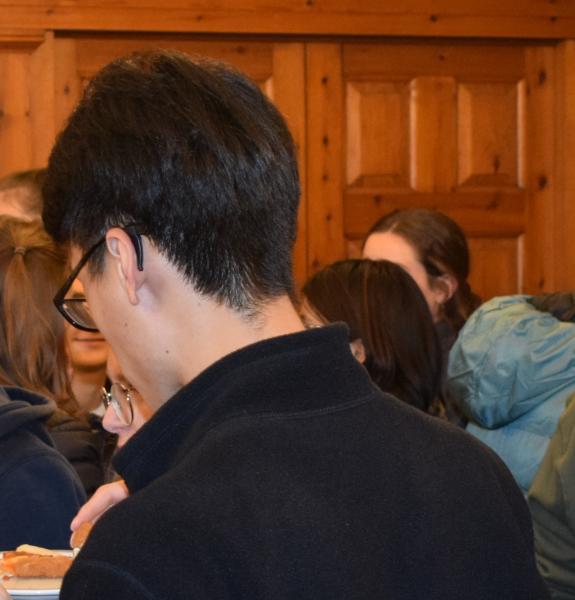
- Why Study ASNC at Christ's?
- Course content and structure
- Teaching
- What do our students think?
- How to apply
- Helpful resources
- Come to an open day or online event
- Need more information?
| Booking is open for our ASNC subject meeting on Tuesday 27 May |
Why Study ASNC at Christ's?

Christ’s is widely known for the study of languages and History and our ASNC students enjoy working within that broader tradition and community.
In fact, Christ’s own library collection began with a gift of medieval books from educationalist, scholar and philanthropist Margaret Beaufort. And Walter William Skeat – first-ever holder of the Elrington and Bosworth Professorship of Anglo-Saxon from 1878 – was a Fellow of Christ's, so the collection of ASNC-related books in the library is long-established.
If you have an interest in early languages and/or an enthusiasm for history, this flexible course should appeal. Depending on your interests, you can focus on Celtic and Germanic aspects, vary the balance between literature and history, or opt for an interesting mix.
Studying such a diverse degree sharpens your analytical powers, teaches you to construct an effective argument and refines your appreciation of literature. Former Christ’s students have gone on to work in areas including the clergy, IT, politics, banking, teaching, law, advertising, the charity sector and technology start-ups.
Course content and structure
We teach all languages in ASNC (below) from scratch, so you don’t need any prior knowledge.
- Old English
- Old Norse
- Medieval Welsh
- Medieval Irish
- Insular Latin
The ASNC course (or ‘tripos’) is a three or four-year degree. Please visit the University website for full details of the Anglo-Saxon, Norse and Celtic course content and structure. You will also find information on the ASNC Faculty page for prospective students with information on ASNC Tripos, Part I and ASNC Tripos, Part II. If you have further questions about the course content, please contact office@asnc.cam.ac.uk.
Teaching
ASNC teaching is a mix of classes and lectures arranged by the University. You also have weekly ‘supervisions’ which last an hour and are usually one-to-one or in pairs. These small-group teaching sessions give you the advantage of personally-tailored tuition with an ASNC department lecturer or postgraduate student.
Christ’s ASNC Director of Studies is Professor Rosalind Love, a Pilkington Prize winner for excellence in teaching. You may also be supervised by Dr Mary Franklin-Brown.
What do our students think?

ASNC students normally join both the university-wide ASNC Society and the Christ's Small Subjects Society. As ASNC is not a large university department, ASNC students tend to be a close-knit bunch, socialising across Colleges and organising weekly lunches, drinks and activities. You might like to explore the ASNC Society YouTube Channel.
Alys studies ASNC here at Christ's College. She has written about her experiences in her student profile. If you would like to hear from other Christ's students, please watch the Christ's student Q&A film, visit our Student Profiles page, and look at the profiles by current and recent ASNC students on the ASNC Department website.
How to apply
Visit How to Apply for full details and a timeline of the application process. We welcome applicants from all backgrounds and school types, all over the world. If you're applying from outside the UK, please read our international students section.
| News |
|---|
|
Subjects: what do you need?
Although there are no required subjects, taking History and/or English is helpful. If you plan to choose any language papers here, it’s a good idea to take a foreign language (such as French, German, Latin or another) at A-level, IB Higher, Scottish Advanced Higher or equivalent to test your linguistic ability.
If you'd like more information about the subjects that ASNC students commonly take, see the entry requirements tab in the university course information.
We encourage students to attend one of our regular Subject Matters webinars for help with choosing Post-16 subjects for competitive university applications. This webinar is pitched for students aged 14-16 though it is also possible to attend when you have started sixth form.
Written work
After we receive your application, we will ask you to upload two essays that you feel accurately reflect your abilities and interests. These should be work written during the normal course of your studies and already marked by a teacher. We advise you to keep copies for your own reference as we may discuss them at interview.
We publish full guidelines on written work in the Current Applicants section on 20 September each year, and the deadline for uploading your essays will be in early November.
Interviews
If we select you for interviews, these usually take place in early December. At Christ's we do all of our interviews online. You can have your interviews either at home (most applicants do this) or at school (if easier).
Those selected for interview are normally interviewed for 35-50 minutes in total. At Christ’s, we usually split the time into two interviews with academics in Anglo-Saxon, Norse and Celtic. Please ensure that you re-read your essays before your interviews.
Most ASNC subjects are not normally taught at school, so we don’t expect you to have specific knowledge of ASNC topics. We want to see that you have a lively general interest in medieval matters, and show intellectual curiosity and flexibility of mind. We’re looking for an aptitude and enthusiasm for what you'll do on the course, such as learning new languages, studying literature and analysing historical documents.
Further, more general information about interviews (including two useful films) is available in the Cambridge interviews section, and it's worth also having a look at supervisions (short film here), as interviews are similar to what you do every week as a Cambridge student.
There is no admissions test for Anglo-Saxon, Norse and Celtic.
Offers
At Christ's we don’t have fixed quotas for places, so the number of students we admit in any year depends on the strengths of the applicants. The average intake of ASNC freshers across the university is around 25 to 30, and here at Christ’s we tend to have one student in any year.
We define the terms of each offer individually, but the typical conditional offer for Anglo-Saxon, Norse and Celtic is:
- A*AA at A-level
- 42 points overall in the International Baccalaureate with 7,7,6 in relevant Higher Level subjects
- A1, A2, A2 in three Scottish Advanced Highers
You need to be academically ambitious: the majority of Christ's students arrive with higher grades than are required.
If you’re taking another qualification, we expect you to be working at or close to the top of the mark range, for example
- Baccalauréat français international (BFI): 17 (mention très bien) out of 20 overall, with a minimum of 17 in individual subjects.
- European Baccalaureate: at least 85% overall, with 9/10 in relevant subjects
You can look up other qualifications in the offer levels for other exam systems and international entry requirements, and if you are applying from outside the UK please read the Christ's international students section for further information and check the country pages.
If you will have finished school when you apply, please also read about post-qualification applications, taking a gap year, and, if relevant, applying from a university.
Helpful resources
| Is ASNC right for you? | Questions to ask yourself |
| Reading suggestions | Suggestions for if you would like to explore some of the topics that you can study in the degree. You may also find the Very Short Introduction books on The Anglo-Saxon Age and The Vikings helpful. |
| HE+ ASNC | Resources for students who would like to explore Anglo-Saxon, Norse and Celtic |
| The Spoken Word | A website enabling you to listen to early languages |
| The Viking Age | Web resources for A level and other students interested in these topics. |
| An Introduction to early Medieval England | An English Heritage resource. |
| In Our Time | Radio 4 podcasts on historical themes, events and individuals. |
| Celtic Studies Resources | Reading suggestions and blog |
| Beowulf | Project Gutenberg online text of old epic poem. See also Information about Beowulf; In our Time episode on Beowulf |
| CamGuides | Introducing the academic and information skills that you will need during your studies, as well as how and where you be working. |
Attend an open day or webinar
Our open days and events page advertises regular online opportunities as well as events you can attend in Cambridge. If you can, sign up for a College Open Day (our October, February and September events normally include a meeting with a subject specialist). Between February and August we run regular webinars:
- Subject Matters: The importance of post-16 subject choices (this one is also run Sept - Nov)
- Cambridge for Beginners
- Personal Statements and preparing for an application
Further subject-specific opportunities you might wish to consider include the ASNC Open Day each June, Subject Masterclasses organised by Cambridge Admissions Office, and subject-specific talks in the July Cambridge Open Days. If you are a UK student from a background where there is little tradition of entry to Higher Education, you can apply to attend a Sutton Trust Summer School in Anglo-Saxon, Norse and Celtic or to shadow a current undergraduate studying ASNC via the Cambridge SU Shadowing Scheme (do be aware that there's a high proportion of applicants to places for both of these last two opportunities so please don't be discouraged if you don't get a place).

Need more information?
For more detail of what the course involves, please read Undergraduate ASNC admissions on the University website and take a look round the ASNC Department website too.
If you can't make it to Christ's in person, please email your queries to our admissions team at admissions@christs.cam.ac.uk. We'll be happy to help.
Undergraduate Admissions / Subject list / How to apply / Why Christ's?


